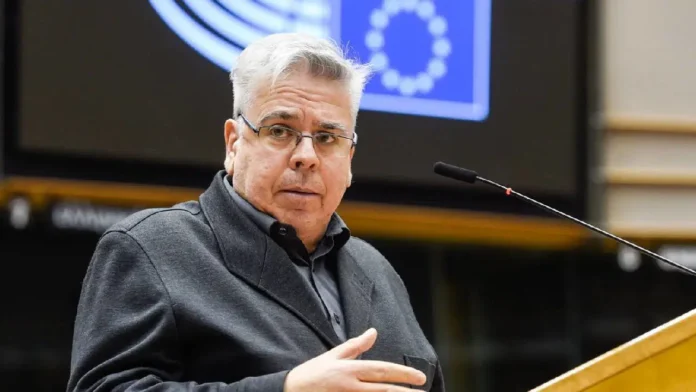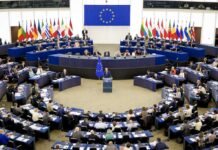Turkey is experiencing an unprecedented level of democratic backsliding, Nacho Sanchez Amor, the European Parliament’s rapporteur on Turkey, said on Wednesday in comments on the European Commission’s 2025 report on Turkey, the Anka news agency reported.
Amor said Turkey’s democratic decline has intensified over the past year, particularly in key EU membership criteria such as the rule of law, amid growing pressure on the opposition and the media.
He noted that the situation has further deteriorated with the arrest of Istanbul Mayor Ekrem İmamoğlu, ongoing pressure on mayors [from the main opposition Republican People’s Party (CHP)], the pro-Kurdish Peoples’ Equality and Democracy Party (DEM Party) and the business community. He underlined that Turkey’s EU accession process is now “completely frozen.”
Referring also to the government’s takeover of media outlets through state-appointed trustees and the increasing harassment of journalists, he said this is a “Russian model of society.”
“No matter how many judicial reform packages you prepare, if your courts are trying 13 or 14-year-old girls on terrorism charges, it is complete nonsense,” Amor said, emphasizing that the case he was referring to reflects the “most horrible situation” of the rule of law and the judiciary in Turkey.
The case, known as “girls trial,” involved terrorism charges against 41 women, including 14 minor girls, over routine religious and educational activities allegedly linked to the faith-based Gülen movement. The indictment cited Quran study, praying, tutoring, bowling, attending social gatherings and living in shared apartments as evidence of terrorism. An İstanbul court convicted 19 defendants in September.
President Recep Tayyip Erdoğan has been targeting followers of the Gülen movement, inspired by the late Muslim cleric Fethullah Gülen, since corruption investigations in December 2013 implicated him as well as some members of his family and inner circle.
Dismissing the investigations as a Gülenist coup and a conspiracy against his government, Erdoğan began to target the movement’s members. He designated the movement as a terrorist organization in May 2016 and intensified the crackdown on it following an abortive putsch in July of the same year that he accused Gülen of masterminding.
Amor also described the conflict between the Constitutional Court and lower courts as “incredible,” stating that the government had paved the way by refusing to recognize European Court of Human Rights (ECtHR) rulings. Following this example, local courts have begun disregarding the Constitutional Court’s authority, which, he said has now “completely vanished.”
The refusal of local courts and the Supreme Court of Appeals to abide by Constitutional Court decisions has been sparking widespread criticism of the Turkish judiciary for its perceived lack of independence. Many observers argue that there is no longer a meaningful separation of powers in the country and that members of the judiciary are under the control of the government and cannot make judgments based on the law.
Amor also criticized the government for failing to hold accountable prosecutors and judges who act in line with the ruling party’s political interests, citing the Istanbul chief public prosecutor as an example of how the judiciary is being used as a political tool.
He said it is impossible to describe Turkey as a state governed by the rule of law under these circumstances or to meaningfully speak about its EU accession process. He added that European leaders now view Turkey not as a candidate country but only as a “strategic partner.”
Amor emphasized that the Turkish government must decide whether it wants to move closer to the EU or focus solely on security cooperation. While acknowledging that the EU continues to engage with Turkey on trade, security and migration, he stressed that EU membership requires upholding democratic standards.
He stated that EU-Turkey cooperation could continue on issues such as the modernization of the customs union, visa liberalization, migration management and the reconstruction of Gaza but said these are under the scope of neighborhood and partnership relations, not EU membership.
“The EU is a club of democracies,” Amor said. “Its founding principles are not drones, weapons or military power, but an independent judiciary, a free press and respect for fundamental rights.”















